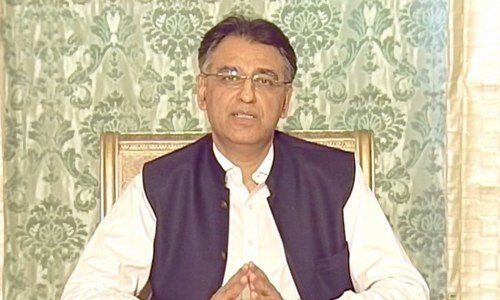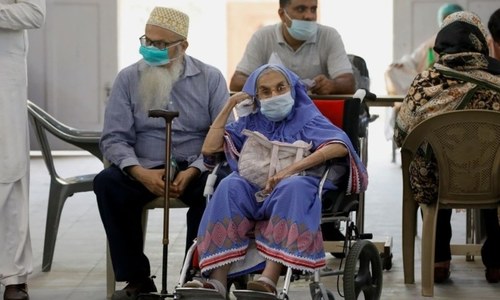• Asks people to observe SOPs, get vaccinated
• Citizens travelling abroad will get Pfizer vaccine
• 44 die, over 1,000 test positive in single day
ISLAMABAD: Minister for Planning, Development and Special Initiatives Asad Umar on Friday warned that the country might be hit by a fourth Covid-19 wave in July if the standard operating procedures (SOPs) were not adhered to.
In a tweet, Mr Umar, who also heads the National Command and Operation Centre (NCOC), said: “Reviewed the artificial intelligence based disease modeling analysis today in NCOC. In the absence of strong SOP enforcement and continued strong vaccination program, the 4th wave could emerge in Pakistan in July. Please adhere to sop’s and vaccinate as soon as possible.”
In March, the third Covid-19 wave had set in and cases reached their peak in April as a result of which curbs were imposed once again. May witnessed a fall in the infection rate, which led the NCOC to ease restrictions from June 15.
In another development, the NCOC decided to allow administration of Pfizer vaccine to those citizens travelling abroad for work.
In a statement, the forum said the decision had been taken on the basis of the new guidelines.
It said people travelling for employment to a country where Chinese vaccines were not accredited, such as Saudi Arabia, could receive Pfizer shots. However, the statement added that this would apply only to those who need to begin their travel before July 26.
Meanwhile, the vaccination drive continued in the country as another 337,248 people were inoculated on Friday, raising the overall figure to 14,503,136.
It may be mentioned here that two million doses of Sinovac vaccine arrived on a special PIA plane at the Islamabad International Airport on Wednesday. In a statement, the NCOC had said that with the arrival of this consignment, daily average administration of doses across the country would enhance considerably.
On the other hand, the NCOC reported 1,052 new patients and 44 deaths in the last 24 hours, with the positivity ratio calculated at 2.29 per cent. As many as 1,013 patients recovered from the deadly virus in a single day.
With the emergence of new cases, the overall tally of Covid-19 patients since the outbreak of the pandemic in the country rose to 952,907 while the death toll climbed to 22,152. The number of active cases has been recorded at 32,921 as of June 25.
Maximum ventilators were in use in four major cities, with Multan recording 28pc occupancy, followed by Bahawalpur, 22pc, Islamabad 21pc and Lahore, 20pc.
The most oxygenated beds were occupied in Gilgit with a percentage of 45, followed by Karachi, 23pc; Muzaffarabad, 19pc and Rawalpindi, 17pc.

Around 267 ventilators were occupied elsewhere in the country with no patient on vent in Balochistan and Gilgit-Baltistan.
Coronavirus was detected in China in December 2019 which then started spreading to other countries. Pakistan closed its borders and took a number of steps to stop the transmission. The first case of Covid-19 was reported in the country in the last week of February last year.
On March 13, 2020, the first meeting of the National Security Committee (NSC), comprising top civil and military officials, was held to discuss the crisis which was declared a pandemic by the World Health Organisation.
Prime Minister Imran Khan presided over the NSC meeting and directed the relevant authorities to devise a comprehensive strategy to prevent the spread of the virus.
A lockdown was announced on March 16, 2020 and a number of industries, educational institutions, restaurants and marriage halls were closed.
The National Disaster Management Authority (NDMA) was involved to ensure availability of medical equipment and health-related supplies and also improve coordination with the provinces.
Pakistan sealed its western border with Afghanistan and Iran and also closed Kartarpur shrine to local people.
However, when the cases started to decline, the National Coordination Committee (NCC) on Covid-19 opened the construction industry on Aug 7, 2020, lifted restrictions on tourism sector on Aug 8 and on restaurants and transport sector on Aug 10.
Similarly, educational institutions and marriage halls were permitted to operate from Sept 15.
In October 2020, the number of cases started to rise again, prompting the NCOC to officially declare the start of the second wave of the virus.
Initially educational institutions from where cases were being reported were closed and then a lockdown policy was announced for hotspot areas.
As the situation worsened, the NCOC on Nov 11 decided to increase restrictions in different sectors and finally shut down educational institutions on Nov 26. The situation improved following which secondary schools and colleges were reopened on Jan 18 and primary and middle schools on Feb 1, 2021.
Published in Dawn, June 26th, 2021














































